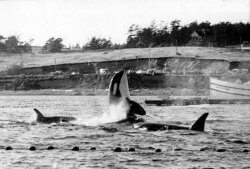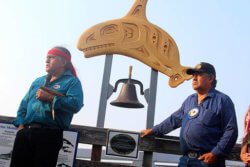During the mid-1800s, in what would soon be known as Washington State, the Lummi people were exiled from their tribal lands – including the San Juan islands – and were relocated to a small reservation on the mainland.
Christian missionaries also separated children from their families, so they could be indoctrinated into European culture.
This month, March 2018, leaders of the Lummi Nation held a ceremony in Miami, Florida – 3,000 miles away from their homeland – during which they performed a song from that painful time about a mother trying to find her baby. The song had a special resonance in that the Lummi people were in Miami to seek the return of another of their family, as they view her: the orca Tokitae (also known as Lolita). In 1970, Tokitae, meaning “nice day, pretty colors”, was taken from her family in the waters of the San Juan Islands and has been living in a concrete tank at the Miami Seaquarium for 47 years. (Six other baby orcas were also taken at that time. None of them are still living.)

Orcas being captured at Penn Cove in August 1970. Photo by Wallie Funk, Whidbey News-Times
Anger and pain have now turned to action as the Lummi people join forces with animal protection groups to demand the return of Tokitae, whose mother, a member of the L pod among the now-endangered Southern Resident Killer Whale group still swims the waters of the Salish Sea and is known to the Lummi as Ocean Sun.
“There’s no way they should be getting away with putting these mammals in captivity for a show,” Lummi natural resource commissioner Steve Solomon told reporters. “Those are our brothers and sisters that were taken.”
The Seaquarium argues that “Lolita,” as they call Tokitae, is loved and well cared for. (Just like the children 200 years ago.) And they call her an “ambassador” for her species. The Lummi vehemently disagree.
“She is not an ‘ambassador,’” says Jewell James, director of the Lummi Nation’s Sovereignty and Treaty Protection Office. “She is a captive and must be reunited with her family. It is our ‘xa xalh xechnging’ [sacred obligation] to do this.”

Lummi Nation members Jewell James (left) and Douglas James, Jr. speaking on the cultural significance of returning Tokitae to her ancestral home. Photo by Patricia Guthrie/Whidbey News-Times
The Lummi people are not about to submit to the Seaquarium. They have gone up against big business before – and won. In 2012 they took on shipping giant SSA Marine, which was preparing to build the Gateway Pacific Terminal, a $665 million project that would have been the largest coal export terminal in the country.
“She is not an ‘ambassador.’ She is a captive and must be reunited with her family.”
The Lummi argued that the terminal would violate their rights under the 1855 Treaty of Point Elliot, which gave them the right to take fish at “usual and accustomed grounds and stations.” The terminal, they said, would bring some of the world’s largest ships into these “usual and accustomed” fishing waters up to 487 times a year to load and unload bulk commodities, principally coal, bound for Asian ports.
Referring to coal as “black death,” the Lummi listed numerous ways that the enterprise would poison the ocean, saying that their legal right to fish demands an environment where the fish can thrive.
As they focus now on the matter of abducted whales, the Lummi are planning a 27-day, 13-stop tour of the country with a custom totem pole designed to honor Tokitae. The tour will end with a major event in Miami in May. Tokitae will also be the focus of a panel of experts at the 2018 Vine Deloria, Jr. Indigenous Studies Symposium at Northwest Indian College.
The Lummi Nation is committed to implementing a protocol for Tokitae, who is over 50 years old, to be transported back to her home waters in Washington State with every precaution being taken to ensure that her health is the highest priority, overseen by veterinarians every step of the way. (This will be standard for all whales who become candidates for retirement to a seaside sanctuary).
The Lummi are determined to have it recognized that members of their families, human or otherwise, are not the property of big business and entertainment, any more than their children, 150 years ago, were the property of an alien religion and culture.
3 Comments
I’m doing a bat mitzvah project on this and hope to raise awareness and money to help Tokitae return to her pod. I hope with all of my heart that the seaquarium lets her go back to her natural home.
In Oct 2017 Philip Levine and the then Mayor of Miami along with the City Council voted unanimously to retire ‘Lolita-Tokitae’. Levine wrote to Fernando Eiroa in Spain, the Ceo of Parques Reunidos, who owns Maimi Seaquarium requesting that Tokitae be retired and sending the plan for her rehabilitation. Nothing.
Feb 2018 the manager of Miami Seaquarium quit after being enlightened to Tokitae’s story.
Feb 2018 Eric Eimstad became manager. He is an old employee returned. If you wish to help email or write:
Eric Eimstad, General Manager, Miami Seaquarium, 4400 Rickenbacker Causeway, Miami, FL 33149
email: eeimstad@miamiseaquarium.com
Go to Yelp for the Seaquarium and leave a review.
Write to the Spanish Owners of Seaquarium:
Fernando Eiroa, President and CEO, Parques Reunidos Services Centrales, S.A,
Paseo De La Castellana, 216-16th Floor, Madrid Spain 28046
Go to:
http://www.orcanetwork.org
gofundme.com/58whntc
gofundme.com/5d23cwg
Please hold Tokitae in a warm place in your heart for her safe journey home to her ancestral waters, to the songs of her heart and her family.
I wish with all my heart, that Miami Seaquarium allows the Lummi tribe to take Tokitae (Lolita) back home to be with her family. The show is over and it’s time to let her go.